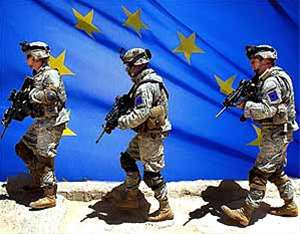
From Toby Vogel, the European Voice: Last month, the EU’s foreign ministers agreed to step up planning for Eufor Libya, an EU military operation to support and protect humanitarian deliveries to Libya and to assist in the evacuation of people displaced by the fighting.
The operation is to be launched only if requested by the United Nations. As long as the UN has sufficient humanitarian access to Libya, and especially the besieged port city of Misrata, no such request will be made. . . .
“It’s a bit strange to put an Italian rear-admiral in charge of a command centre in Rome for an operation that doesn’t exist at present and is unlikely ever to be launched,” a senior national diplomat said. But, the diplomat continued, “there was a lot of pressure by the French and others to demonstrate that the EU is a military player. . . .”
One of the two battlegroups currently on stand-by is led by the Dutch and includes around 700 Germans. The German government has indicated that it will send troops to Libya if the call comes – but the Dutch are reticent, pointing to the massive cuts that they are planning to make to the national defence budget.
The other battlegroup is led by Sweden – a country that delayed the EU’s planning for Eufor Libya because it wanted to play down the prospect of military action – and includes Finland, whose new government is expected to be sceptical about spending money to send soldiers to north Africa.
These difficulties make it unlikely that Eufor Libya will be made up of a single, coherent EU battlegroup. But if the battlegroups cannot be deployed to protect humanitarian deliveries under a UN mandate in a country that is in the EU’s neighbourhood, what is the point of having them?
No EU battlegroup has so far ever been deployed: Eufor Libya will either be a precedent for future action or for future inaction. (graphic: tangledblog)
Image: euro%203%2024%2011%20Euro%20Army.jpg
